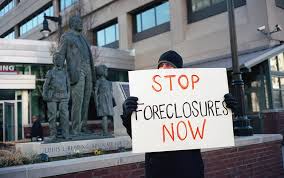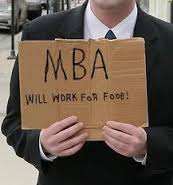Now we care about how Steve Mnuchin at OneWest Bank handled foreclosures?

I cannot even count how many articles have been published over the last few days, to say nothing of the coverage by television news, expressing widespread outrage over OneWest Bank’s handling of foreclosures starting in 2009, when Trump’s Treasury Secretary, Steven Mnuchin was OneWest’s CEO.
I’ve even received a few calls and emails from journalists asking all sorts of questions about what went on at OneWest Bank back then as related to homeowners applying for loan modifications. I was shocked that they seemed shocked at what I had to say.
Like it was major “news,” all of a sudden, that OneWest Bank was failing to modify mortgages per the government program’s guidelines and therefore foreclosing on thousands of homes all over the country unnecessarily starting in 2009? It wasn’t even major “news” when it was happening.
All I kept thinking was how nice it would have been if the media and others would have cared about what OneWest was doing back in in 2009 or 2010 or 2011… you know, when perhaps it could have been stopped. Writing about it now feels kind of like closing the barn door after the horses have run out, and the re-opening it and shooting any horses left inside.Â
Obviously, we’re now all concerned about OneWest Bank’s foreclosure practices simply and solely because Donald Trump picked Steven Mnuchin for Treasury Secretary… his crime is being chosen by Trump, not foreclosing on too many homes while CEO of OneWest Bank. That’s just the target on his back that’s easiest to hit.Â

Precious few in the media gave half a hoot about OneWest’s foreclosure practices back then, now they feign outrage, using the tragedy of unnecessary and improper foreclosures as a trojan house, if you will.Â
So, now the media is on fire over the whole foreclosure thing… because Trump picked him to head up the Treasury Department. I get it… now it’s news. Back then, tens of thousands of homeowners losing homes to foreclosure that shouldn’t have… not that big a deal. They were all just irresponsible borrowers who had bought homes they couldn’t afford, remember?
The courts, during those years, did nothing to prevent it from happening. The media barely covered it. No one got into any real trouble over it, beyond a few fines being imposed here and there, with no admission of guilt, of course. Heck, throughout the crisis the Republicans wanted foreclosures to happen faster, if you recall. To the GOP, the problem was that foreclosures weren’t happening fast enough. Not that the Democrats were much better, I understand, but at least they tried to appear like they wanted to be helpful.
So, is Steve Mnuchin unfit or unqualified to be Treasury Secretary?Â
Well, first of all, he’s no different than any of the other Treasury Secretaries I can remember and I’m not even sure who could we possibly find to serve as Treasury Secretary that didn’t profit from the financial or foreclosure crises, to say nothing about the bailouts and quantitative easing that followed. (Actually, Tim Geithner is the only one I can think of that didn’t profit from foreclosures directly, which is ironic to say the very least.)

Before I answer that, let’s just take a moment to look back on a few of our past Treasury Secretaries…
Like, Robert Rubin (1995-1999), who was Co-Chairman of Goldman Sachs after becoming a partner in 1971. After his years in government, he went on to take over Citigroup before retiring with $126 million in cash and prizes. Rubin graduated from Harvard, summa cum laude, with a degree in economics, after which he went to Harvard Law, the London School of Economics, receiving his LL.B from Yale in 1964.
Okay, so he’s a smart guy… although not smart enough to oppose the things that might have prevented the biggest meltdown of the financial markets in 70 years that occurred back in 2008.
Rubin’s successor was his deputy at Treasury… Lawrence “Larry” Summers, who served from 1999-2001. From 1991 to 1993 Summers served as Chief Economist of the World Bank and before coming to Washington, Summers was the Nathaniel Ropes Professor of Political Economy at Harvard University. So, another smart guy who, after his involvement as an economic advisor in the Obama Administration, would likely have a hard time being confirmed for anything today.
Henry “Hank” Paulson, who was Treasury Secretary from 2006-2009, was another former Chairman/CEO of Goldman Sachs. He’s most famous for TARP, of course, which would probably make his confirmation hearing today a non-starter beyond anything Mnuchin is experiencing.
Currently, our Treasury Secretary is Jacob Lew, who was confirmed by the Senate in 2013. He was White House Chief of Staff and Director of the Office of Management and Budget (OMB) during the Clinton Administration, but before that, Lew was managing director and COO at two different Citigroup business units… so there’s that.
In 2001, Paul O’Neil was George W. Bush’s pick to lead the Treasury Department. O’Neil’s resume featured his tenure as Chairman and CEO of aluminum giant Alcoa, a corporation employing more than 140,000 employees world wide.

Taking the Good with the Bad…
It should be noted that each of the past Treasury Secretaries above, although many may now see them in a negative light as a result of what’s been allowed to go on since 2009, but they are also all credited with doing some very good things for this country. O’Neil, for example, after 9-11, was applauded for having “helped restore confidence in the economy by vowing to eliminate the funding source of terrorist attacks.”Â
Throughout his tenure, Secretary O’Neill fought terrorist financing, working closely with Middle Eastern countries to stop things like money laundering and he was instrumental in setting up a special task force to combat terrorist finance, which led to the creation of today’s Office of Terrorism and Financial Intelligence.
Rubin, on the positive side of the equation, is known as a strong advocate of “policies to provide greater skills and support for workers and low income Americans, particularly those in the inner city, and he supported aid for developing nations.” He also worked to reform the IRS, redesign the Nation’s currency to combat counterfeiting, decrease the accessibility of guns to former felons and to minors, enhance Presidential security and more.
Upon his retirement, President Clinton called Rubin the “greatest Secretary of the Treasury since Alexander Hamilton.” Yet, in 2009, there were plenty of people ready to burn him in effigy.
Larry Summers is known for his role in the United States supporting Mexico after its 1995 financial crisis, then for crafting the response to the Asian financial crisis of 1997. He’s credited with introducing indexed Treasury debt securities and for reforms of the Internal Revenue Service.
Not only all of that, Summers was also the first Treasury Secretary since the 1920s to use budget surpluses to repurchase Treasury debt, extending the life of the Social Security and Medicare trust funds. And he led efforts to modernize the financial system, address corporate tax shelters and curtail predatory lending practices… although I’m not sure I’d keep those last two items on my resume, if I were him.
And Summers is also known for working to ensure the opacity of the over-the-counter derivatives market, and we should all know how well that worked out for credit default swaps in 2008.
My overriding points is that in its February 15, 1999 edition, Time Magazine referred to Summers, Rubin and former Fed Chair Alan Greenspan as: “The Committee to Save the World.” Nine years later, we found out that what they’d actually done wasn’t… well, let’s just say that ultimately it didn’t work out quite as well as perhaps they thought it might at the time.

Getting back to Mnuchin today…
Is Steve Mnuchin any less qualified for the post than any of the Treasury Secretaries from our recent past? No, I don’t see how anyone could make that case.
Steve started his career as a trainee at Solomon Brothers, which is widely considered the birthplace of the same sort of securitization that caused so many of the problems for homeowners over the last eight years. After graduation, he went to Goldman Sachs, where his father worked since 1957. Â
At Goldman Sachs he actually started the mortgage department… yes, that’s where mortgage backed securities are born and sold. He was made partner in ’94. After 17 years there, he founded a number of hedge funds, before putting together a group of zillionaires, including George Soros, Chris Flowers (Goldman’s former god of banking), and Michael Dell, to buy failed IndyMac Bank from the FDIC for $1.55 billion in 2009… which was a bargain considering the failed bank had assets of $23.5 billion in commercial loans, mortgages and mortgage backed securities on its books.Â
The failed bank had become profitable again as OneWest just a year after Mnuchin had bought it. By 2015, Mnuchin had turned OneWest into one of the largest banks in Southern California, with assets worth $27 billion.Â
Later that year he sold OneWest to CIT Group for $3.4 billion, more than twice what his group paid for the bank in 2009. Mnuchin, in exchange for his stake in OneWest Bank, reportedly owned CIT Group stock worth $97 million.

You might not like what he did… or how he did what he did, but I’m sure not everyone sees it the same way because whatever else he did, it’s undeniable that he took a failed bank and turned it around in a few years for a $2 billion profit to investors. Not everyone is going to hate what he accomplished.
I suppose that, depending on your perspective, he’s either a financial genius or a nefarious opportunist extraordinaire who profited from other’s misfortune. The truth probably lies somewhere in the middle.
Here’s the real deal on Mnuchin and OneWest…
First of all, let’s all recognize the following facts… as they are facts.
- If Steve Mnuchin hadn’t bought OneWest Bank, someone else would have and there’s no reason to believe that person would have handled things any differently.Â
- Secondly, let’s all understand that what OneWest did as related to homeowners in 2009, 2010 and 2011, should NOT be considered uncommon, let alone unique. During those years especially, every single bank or servicer was doing the same things with the same sorts of outcomes. And don’t be confused… compared to Wells Fargo, OneWest was awesome.
- While it’s true that during the the early years of the crisis, OneWest Bank was among the worst at modifying loans, it’s also true that after 2011, they got much better. By 2012, I’d have to rank them as being among the best at getting loans modified, right behind Bank of America and Ocwen… and then they sold their servicing mostly to Ocwen, as I recall, and that was the end of that.
It’s been over eight years since the financial crisis caused the secondary mortgage market to freeze, which started the downward slide in home prices, which reduced consumer spending, caused unemployment to skyrocket, and ultimately put millions of Americans at risk of losing their homes to foreclosure.Â
I think that’s enough time to have gotten your arms around the truth of what actually happened beginning in the second half of 2007, that ended up leaving this country and in fact, the world, at the brink of financial Armageddon. It’s time to face the reality of the situation. It might not be as dramatically interesting as the story about a conspiracy perpetrated by evil bankers out to bankrupt the planet, but it’s the truth.

To begin with, understand that by 2009, our collective patience was low and our panic level was high. It’s understandable when you consider that we had waited on pins and needles through the last year of the Bush presidency with nothing being done to help homeowners, so by the time of Obama’s inauguration, we had something like four million homes on track for foreclosure, with thousands more coming each day. And almost inconceivably, that wasn’t even the country’s biggest problem at the time.
The pressure on the new president to do something to prevent foreclosures was intense, as one might imagine, so within his very first month in office, Obama announced the Making Home Affordable program, which he said would prevent foreclosures by allowing homeowners to get their loans modified. He talked about two percent interest rates and principal reductions… about how homeowners would be able to contact their banks directly and their loans would be modified.
The problem was that none of those banks were anywhere close to being ready to handle the onslaught of calls they would start receiving from homeowners almost immediately… and the tragedy that ensued was previously unimaginable.Â
When Obama described his program designed to save homes from foreclosure, millions felt almost as if they’d been saved from the electric chair. The problem was that loan modifications on this scale had never even been attempted before so no one was anywhere close to prepared. There were no systems, no policies, no trained personnel and no real idea of how many homeowners would be calling or what it would take to address their needs.
From day one, banks didn’t even have the capacity to answer the volume of calls, let alone to actually assist someone with a loan modification. A senior manager at one of the big banks once told me that those days were absolute pandemonium… no one in the rank and file knew what they were supposed to do because those upstairs were still trying to figure it out.

The bigger problem, from the Obama Administration’s perspective, was that there were no good choices. If they delayed implementation of the program, millions of homeowners would lose homes to foreclosure waiting for the industry to prepare.Â
There was no legal way for the government to prevent a foreclosure, it was a private contract between a borrower and a lender, and under certain circumstances it allows for foreclosure. Maybe Congress could have acted by passing some sort of “national emergency” foreclosure freeze, but after Rick Santelli ranted on CNBC about how he didn’t want to pay for his neighbor’s kitchen remodel, our politicians lost their will for such drastic action (and Santelli went on to found The Tea Party.)
We didn’t know it at the time, but banks responded by outsourcing whatever they couldn’t handle internally, and although that may have helped answer calls, it also made things harder to control. What ensued was absolute chaos that at its worst, destroyed lives… at best, it was the sort of nightmare you’d never want to have more than once.
Bank of America, for example, ultimately had to hire and train 50,000 new employees to serve distressed homeowners. The turnover rate was high, so the hiring and training was never ending. And while banks are generally good at handling repeat transactions, loan modifications were snowflakes… no two situations were alike.
Then there were the constantly changing rules, with different lenders having different rules. The government program, HAMP, had “guidelines,” but Fannie Mae and Freddie Mac had their own rules and guidelines… and each private trust was governed by its own contractual provisions written into 500+ page documents known as Pooling & Servicing Agreements.

It was like watching the blind leading the desperately hungry up Everest in flip-flops. No matter which bank you were dealing with back then, the loan modification process was something like being forced to play pin the tail on the donkey in the dark with no shoes on and shards of broken glass all over the floor.
In 2009, over a million homeowners that applied for loan modifications were placed into “trial plan” status, but by that year’s end only 3,000 had been permanently modified.
The point is that OneWest Bank was only one of the many players that weren’t modifying loans in line with HAMP’s published guidelines or anyone’s expectations back then… and they weren’t the biggest offender, nor were they the worst… although they were bad, especially in the early years.
Remember, servicer systems was built to send out statements, collect and post payments, and when payments weren’t made for a period of time… the system was built to foreclose. That’s what everyone involved wanted the systems to do, so that’s what the systems were built to do. Now, all of a sudden, they were being asked to do something completely different… modify loans under certain circumstances and in certain ways.
So, while OneWest was bad… so was everyone else.Â
Does that mean that Steve Mnuchin is a bad person who who should be barred from serving as Treasury Secretary because of OneWest and not modifying loans? I’m not saying you should embrace him, but he is qualified, he is smart… and I’m not sure he warrants rounding up a posse and bringing a rope.Â
None of the other much larger banks were significantly better, if at all. The whole thing was undeniably a failure of government as much as it was anything else. And who can even imagine who might replace Mnuchin, were he not confirmed? Based on choices like Betsy DeVos for Education Secretary, Ben Carson at HUD and Rick Perry at Energy, I’d say it’s possible that we could end up seeing Mnuchin replaced by a guy that caddied for Trump in college and is “terrific” in math.Â
“He’s a genius, this kid. Has all sorts of ideas. You’ll see.”
Look, what happened was a national tragedy. I couldn’t equate it with genocide, but it was on the same continuum. Had it been handled differently… better… this country would be a very different place today… less divided, less angry, and far less economically challenged. Steven Mnuchin was one small component of that tragedy, nothing more.Â

2012 was not 2009…
No one likes to think about it, but most banks and servicers did get better at modifying loans as time passed, you could feel it for the first time starting in 2012, and 2013 was better still. Well, maybe Wells Fargo wasn’t much different by then, but almost everyone else was.Â
By 2012, the lost paperwork syndrome had pretty much come to an end, and people stopped finding out their house sold after the fact. It was the year of the National Mortgage Settlement, and although the settlement itself was widely criticized for its various inadequacies, things did improve significantly after it had been rolled out to homeowners.
It’s only fair to recognize that OneWest Bank did get much better at modifying loans to prevent foreclosure over time, while I could easily make you a list of servicers who didn’t, or at least not to the same degree as OneWest, and that leads me to believe that they were trying.
Honestly, when I heard OneWest was selling its servicing portfolio to Ocwen, I believe, I remember being sad to see them go as they had finally become almost as good as it gets in the servicing world, as far as loan modification was concerned anyway. Like I said, and I think you’d hear the same thing from others close to the crisis during those years, Bank of America became the best… Ocwen, for the most part, was a close number two, and then I’d give it to OneWest in their last year or two.

Now, don’t send me nasty emails about how OneWest, Bank of America or Ocwen totally screwed you over… I’m sure any of them could have done so and I have no trouble whatsoever believing that any of them did just about anything to you or someone you know. What happened to you, however, is not evidence that you are right and I am wrong.
From the earliest days of the crisis, I was able to personally communicate with and even follow closely, thousands of homeowners from all over the country… every bank and servicer… Fannie, Freddie, FHA, VA… USDA. (It’s true, the USDA has a mortgage program, and you haven’t lived until you’ve seen a loan modification go into the black hole at the USDA.)
Not only that, but along the way I met and became friends with many of the top lawyers in the country representing homeowners at risk of foreclosure and I think you could multiply the number of homeowner stories I’ve heard by five or ten because of that. And I met with servicers to find out from their perspective what was going on.
So, there you have it… fair and balanced, with the benefit of hindsight, on the subject of Steven Mnuchin for Treasury Secretary. I hear that he’s all but certain to be confirmed, by the way, so that upsets you, I hope this has helped lower your anxiety. He’s a very smart guy who KNOWS the mortgage market like Trump knows Mar-a-Lago.Â

Is he a mega-rich guy? Of course, but these days I don’t think they make candidates for Treasury Secretary that aren’t mega-rich or certainly rich enough.Â
Here’s what Mnuchin said only yesterday…
“I have been around the mortgage industry for 30 years and I have seen this for a long period of time. This is an area I believe I have expertise in. For very long periods of time, I think Fannie and Freddie have been well run without creating a risk to the government.
I believe these are very important entities to provide the necessary liquidity for housing finance. What I have committed to is that I will work with both the Democrats and Republicans. What I have said and believe, we need housing reform. We shouldn’t just leave Fannie and Freddie as they are for four or eight years under government control without a fix. I believe we can find a bipartisan fix for these.”
Compared with some of the others Trump has chosen for cabinet positions, Steven Mnuchin looks positively dreamy to me. I never thought I’d hear myself defending the CEO of OneWest Bank for any reason, so if you’re surprised at my view, I understand.Â
However, I know that Mr. Mnuchin knows how to make the housing and mortgage markets move forward… his track record shows that he’s a problem solver… and we’ve certainly got a few problems ahead that will require attention by those who really know what they’re doing.
Steve does.
Mandelman out.
Click PLAY below to watch Steven Mnuchin’s Senate confirmation hearing, but warning… watching the senators ask questions about HAMP can make you want to chew on glass.Â


